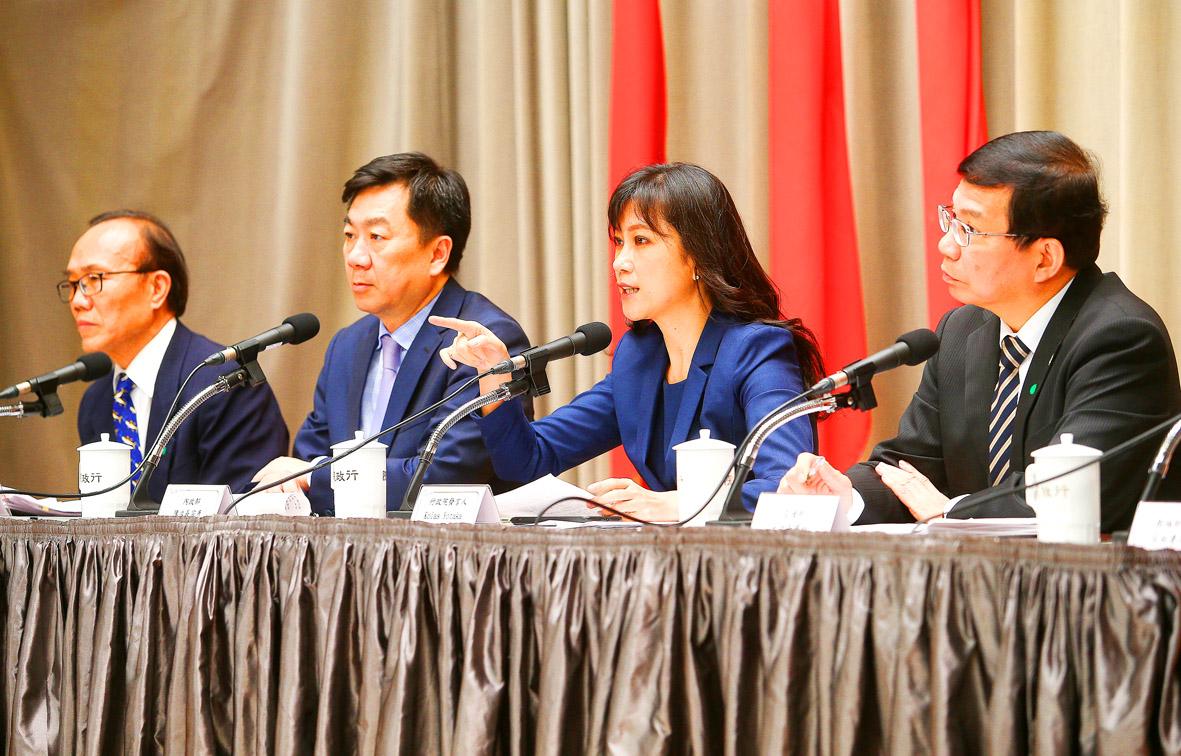The Straits Exchange Foundation yesterday announced a third set of flights to evacuate 440 Taiwanese from China’s Hubei Province due to the COVID-19 pandemic.
The flights, operated by China Airlines Ltd (中華航空) according to its normal schedule, are on Sunday and Monday next week.
They are to depart Shanghai Pudong International Airport at 7:50pm and arrive at Taiwan Taoyuan International Airport at 9:50pm, the foundation said.

Photo: CNA
China Airlines is to dispatch two Boeing 777.
The aircraft has a capacity of 358 passengers, but each would only carry 220 to ensure a proper distance is maintained between those onboard, it said.
Within hours of the foundation starting to accept requests to book seats on the two flights, they had been overbooked, Deputy Minister of the Interior Chen Tsung-yen (陳宗彥) said.
As in the two previous rounds of evacuations — which used charter flights — all passengers would be required to wear a mask and protective clothing, he said.
Prior to boarding, passengers would have their temperature checked by medical personnel, Centers for Disease Control (CDC) Deputy Director-General Chuang Jen-hsiang (莊人祥) told a news conference at the Executive Yuan in Taipei.
After arriving in Taiwan, they would be sent to a designated quarantine facility for 14 days and tested for COVID-19 within 48 hours, he said.
As there are at least 1,000 Taiwanese stranded in Hubei, the Ministry of the Interior would decide whether to employ more regular flights to repatriate them after reviewing the efficacy of the model, Chen said.
Taiwanese who have been in Hubei since the pandemic started would not be allowed to book flights home on their own, he said.
Asked whether the Chinese spouses and children of Taiwanese would be excluded from the flights as they were in the previous evacuations, Chen said that had not yet been decided.
Chen said that with the exception of Wuhan, the lockdown of Hubei Province has been lifted, but he did not give any recommendations on how people in the province should travel to Shanghai to take the flights.
The upcoming flights are the result of intensive discussions, presided over by Vice Premier Chen Chi-mai (陳其邁), on Tuesday and Wednesday between officials from the foundation, the CDC, the Mainland Affairs Council, the National Security Council and the Civil Aeronautics Administration, Executive Yuan spokeswoman Kolas Yotaka said.
Asked whether Taiwan would send direct flights to Wuhan, the original epicenter of the outbreak, to evacuate Taiwanese, Kolas said that the government would determine which model would best accomplish its overarching goal of meeting the high disease-prevention standards of the “Taiwan model,” as well as which method is most efficient.
The foundation and the Mainland Affairs Council would continue negotiating with Chinese authorities over any future flights, she added.
Additional reporting by Chung Li-hua

SECURITY: As China is ‘reshaping’ Hong Kong’s population, Taiwan must raise the eligibility threshold for applications from Hong Kongers, Chiu Chui-cheng said When Hong Kong and Macau citizens apply for residency in Taiwan, it would be under a new category that includes a “national security observation period,” Mainland Affairs Council (MAC) Minister Chiu Chui-cheng (邱垂正) said yesterday. President William Lai (賴清德) on March 13 announced 17 strategies to counter China’s aggression toward Taiwan, including incorporating national security considerations into the review process for residency applications from Hong Kong and Macau citizens. The situation in Hong Kong is constantly changing, Chiu said to media yesterday on the sidelines of the Taipei Technology Run hosted by the Taipei Neihu Technology Park Development Association. With

CARROT AND STICK: While unrelenting in its military threats, China attracted nearly 40,000 Taiwanese to over 400 business events last year Nearly 40,000 Taiwanese last year joined industry events in China, such as conferences and trade fairs, supported by the Chinese government, a study showed yesterday, as Beijing ramps up a charm offensive toward Taipei alongside military pressure. China has long taken a carrot-and-stick approach to Taiwan, threatening it with the prospect of military action while reaching out to those it believes are amenable to Beijing’s point of view. Taiwanese security officials are wary of what they see as Beijing’s influence campaigns to sway public opinion after Taipei and Beijing gradually resumed travel links halted by the COVID-19 pandemic, but the scale of

A US Marine Corps regiment equipped with Naval Strike Missiles (NSM) is set to participate in the upcoming Balikatan 25 exercise in the Luzon Strait, marking the system’s first-ever deployment in the Philippines. US and Philippine officials have separately confirmed that the Navy Marine Expeditionary Ship Interdiction System (NMESIS) — the mobile launch platform for the Naval Strike Missile — would take part in the joint exercise. The missiles are being deployed to “a strategic first island chain chokepoint” in the waters between Taiwan proper and the Philippines, US-based Naval News reported. “The Luzon Strait and Bashi Channel represent a critical access

Pope Francis is be laid to rest on Saturday after lying in state for three days in St Peter’s Basilica, where the faithful are expected to flock to pay their respects to history’s first Latin American pontiff. The cardinals met yesterday in the Vatican’s synod hall to chart the next steps before a conclave begins to choose Francis’ successor, as condolences poured in from around the world. According to current norms, the conclave must begin between May 5 and 10. The cardinals set the funeral for Saturday at 10am in St Peter’s Square, to be celebrated by the dean of the College